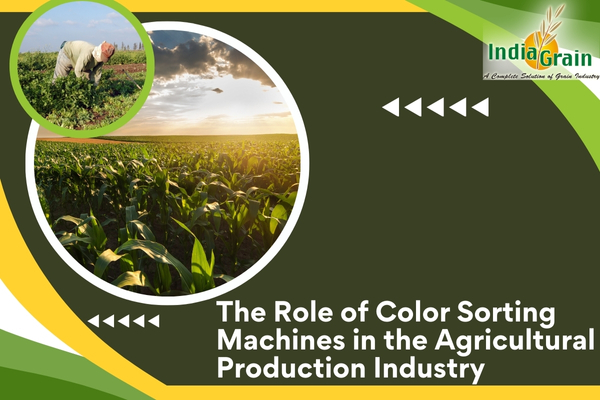
Blog-details
Posted By : Anil Yadav
Blog Date : 10th June, 2024
The Role of Color Sorting Machines in the Agricultural Production Industry
In the fast-paced world of farming today, new tech tools are key for improving how things are done and what's produced. A standout innovation making a big difference is the color sorting machine. This cutting-edge tool has flipped the script on how we handle farm goods - ensuring great quality and cutting down on waste. So, let's discover what these color sorting machines are doing for farming and why they're so beneficial.
What is a Color Sorting Machine?
A color sorting machine, also known as an optical sorter, is an advanced piece of equipment used to separate items based on their color. These machines utilize high-resolution cameras and sensors to detect and differentiate colors in agricultural products. By identifying and removing defective, discolored, or contaminated items, color sorting machines ensure that only the best products move forward in the production process.
How Do Color Sorting Machines Work?
The operation of a color sorting machine involves several key steps:
Feeding : Agricultural products are fed into the machine via a hopper or conveyor belt.
Scanning : As the items pass through the machine, high-speed cameras and sensors scan them for color variations.
Processing : The machine's software analyzes the images and detects any items that do not meet the desired color criteria.
Ejection : Air jets or mechanical arms remove the identified defective items from the production line.
This precise sorting mechanism allows for rapid and accurate separation of products, significantly improving the overall quality of the agricultural produce.
Benefits of Color Sorting Machines in Agriculture
Enhanced Product Quality :
By removing defective and substandard items, color sorting machines ensure that only high-quality products reach the market. This leads to increased consumer satisfaction and trust in the brand.
Increased Efficiency :
These machines can process large volumes of agricultural products quickly and accurately, reducing the need for manual sorting. This not only saves time but also minimizes labor costs.
Reduced Waste :
By accurately sorting and removing only the defective items, color sorting machines help reduce waste, ensuring that more of the harvested produce is utilized effectively.
Consistency and Standardization :
Color sorting machines provide consistent and standardized results, which is crucial for maintaining product quality and meeting regulatory standards.
Versatility :
These machines are versatile and can be used for a wide range of agricultural products, including grains, nuts, fruits, and vegetables. This flexibility makes them an invaluable asset in various segments of the agricultural industry.
Applications of Color Sorting Machines in Agriculture
- Grain Sorting : In grain processing, color sorting machines are used to remove discolored, moldy, or damaged grains, ensuring that only high-quality grains proceed to the market.
- Nut Processing : These machines help in sorting nuts by removing shells, damaged nuts, and foreign materials, thus enhancing the overall quality of the final product.
- Fruit and Vegetable Sorting : Color sorting machines are used to sort fruits and vegetables, removing any that are overripe, underripe, or damaged, ensuring uniformity and quality in the produce.
Conclusion:
Farmers use color sorting machines now. It's a big step into the future. These machines help improve crops, make work faster, and cut down on garbage. This is important. More people want good food, and we need farming to last. As tech gets better, more cool ideas will come up. This will change farming even more.
Frequently Asked Questions
A color sorting machine, also known as an optical sorter, is a device used in the agricultural industry to separate items based on their color. It uses high-resolution cameras and sensors to detect and remove defective, discolored, or contaminated items from a batch of agricultural products.
A color sorting machine works by feeding agricultural products through a hopper or conveyor belt, where high-speed cameras and sensors scan them for color variations. The machine's software analyzes these images and identifies items that do not meet the desired criteria. These items are then removed using air jets or mechanical arms.
The main benefits include:
Enhanced product quality by removing defective items.
Increased processing efficiency and reduced labor costs.
Reduced waste by accurately sorting and utilizing more produce.
Consistency and standardization in product quality.
Versatility in sorting various agricultural products like grains, nuts, fruits, and vegetables.
Color sorting machines are commonly used in a variety of agricultural products, including:
Grains (e.g., rice, wheat, corn)
Nuts (e.g., almonds, peanuts, walnuts)
Fruits (e.g., apples, berries, citrus fruits)
Vegetables (e.g., peas, beans, potatoes)
